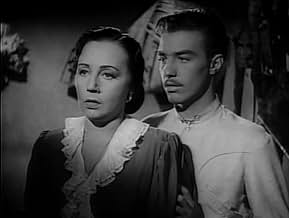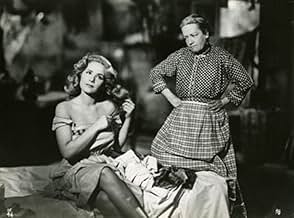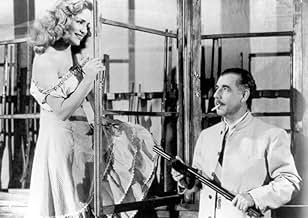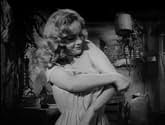CALIFICACIÓN DE IMDb
7.2/10
2.4 k
TU CALIFICACIÓN
Una joven inestable se fuga de un reformatorio y, con engaños encuentra, refugio con una familia bondadosa entre la que sembrará discordia.Una joven inestable se fuga de un reformatorio y, con engaños encuentra, refugio con una familia bondadosa entre la que sembrará discordia.Una joven inestable se fuga de un reformatorio y, con engaños encuentra, refugio con una familia bondadosa entre la que sembrará discordia.
- Dirección
- Guionistas
- Elenco
- Premios
- 1 nominación en total
Jesús García
- Empleado de Guadalupe
- (sin créditos)
Leonor Gómez
- Empleada de Guadalupe
- (sin créditos)
Opiniones destacadas
Susana is a fallen girl. At the beginning we see her in a reformatory, but the reasons that brought her there remain in the dark. We just find out that she has learned nothing new in the two years she has spent there and that she behaves in the same unruly and rebellious way like when she was first admitted to the place.
She is brought into a dark and sinister cave which is teeming with rats and spiders. We know nothing about the reasons for this punishment and we can't avoid feeling sorry for her: Whatever she might have done, it does not justify an inhuman treatment such as this.
Susana is religious, and the god she calls on is kind and generous. So the miracle happens, the bars of the prison cell at which she is rattling suddenly give way and she succeeds in escaping into a night full of darkness and relentless rain.
She even can make it into paradise: A landowner's family takes her in, after she has told them a pack of lies. She is allowed to work as a maid and gains the confidence and the affection of the mother, while the father at first has a disapproving attitude towards her.
But the family's son and the steward live on the estate, too, and they don't fail to notice Susana's outstanding physical attraction. As the girl also knows how to place her charms, they both fall victim to her.
Susana, however, does not seem capable of developing any true feelings. Life is just a villainous game for her in which the rules are set by herself. The aim is to destroy the well established order. When finally even the landowner succumbs to the lure of love the initial situation becomes reversed and nothing stays the same: the mother turns into an enraged enemy, while father and son become rivals and the steward is dismissed.
It is then the latter who sets the decisive ball rolling which leads once more to a reversal of the circumstances: He finally makes use of his knowledge of Susana's escape from the reformatory, which up to now he kept to himself in order to increase his chances of winning Susana's favor, and Susana, however fiercely she may be defending herself, cannot avoid being arrested.
The game is lost, and, as it often happens in a melodrama, it is the refused lover, who makes it break down. In the end, the episode with Susana means nothing more than the memory of a nightmare for the landowner's family. And, after the re-establishment of the initial situation, the characters cannot help asking themselves if everything has really happened.
The attentive spectator will come to a different conclusion. He will notice the fundamental fragility of an order that is well established only in appearance. And he will not be able to avoid drawing a frightful parallel to his own life, in which nothing is secure and reliable either.
She is brought into a dark and sinister cave which is teeming with rats and spiders. We know nothing about the reasons for this punishment and we can't avoid feeling sorry for her: Whatever she might have done, it does not justify an inhuman treatment such as this.
Susana is religious, and the god she calls on is kind and generous. So the miracle happens, the bars of the prison cell at which she is rattling suddenly give way and she succeeds in escaping into a night full of darkness and relentless rain.
She even can make it into paradise: A landowner's family takes her in, after she has told them a pack of lies. She is allowed to work as a maid and gains the confidence and the affection of the mother, while the father at first has a disapproving attitude towards her.
But the family's son and the steward live on the estate, too, and they don't fail to notice Susana's outstanding physical attraction. As the girl also knows how to place her charms, they both fall victim to her.
Susana, however, does not seem capable of developing any true feelings. Life is just a villainous game for her in which the rules are set by herself. The aim is to destroy the well established order. When finally even the landowner succumbs to the lure of love the initial situation becomes reversed and nothing stays the same: the mother turns into an enraged enemy, while father and son become rivals and the steward is dismissed.
It is then the latter who sets the decisive ball rolling which leads once more to a reversal of the circumstances: He finally makes use of his knowledge of Susana's escape from the reformatory, which up to now he kept to himself in order to increase his chances of winning Susana's favor, and Susana, however fiercely she may be defending herself, cannot avoid being arrested.
The game is lost, and, as it often happens in a melodrama, it is the refused lover, who makes it break down. In the end, the episode with Susana means nothing more than the memory of a nightmare for the landowner's family. And, after the re-establishment of the initial situation, the characters cannot help asking themselves if everything has really happened.
The attentive spectator will come to a different conclusion. He will notice the fundamental fragility of an order that is well established only in appearance. And he will not be able to avoid drawing a frightful parallel to his own life, in which nothing is secure and reliable either.
This film, judging by some of the reviews on this page, seems to have a provocative effect: one person seems to feel that Susana is evil incarnate and should have been killed. Perhaps that's the point: Bunuel may very well have meant her to be a caricature of the "bad girl." While she uses her sexuality as a weapon, she is merely provoking desires that were always there. The family she inserts herself into is an apparently happy one, and perhaps itself a stereotype, with feelings under the surface waiting to escape, just as Susana herself is an escapee. Her seduction technique is itself pointedly obvious, and Bunuel may very well have been telling something of a joke with this film, neither his best nor worst. And the actress who plays Susana does have nice shoulders.
For years I have had a poster for this film on my wall but not until now have I ever seen it. It may have been included in a season at the National Film Theatre many years ago when I know I saw, Ascent to Heaven, but not this one. Even on my poster, Rosita Quintana looks alluring, but not quite as alluring as she is in this, simple yet effective, little known melodrama. The camera-work is marvellous with all manner of angles and shades of black and despite the predictability of the disruption this 'fallen woman' will precipitate, there are plenty of Bunuelian touches. I agree with others that the happy ending is probably nothing of the sort. Even Mexicans don't shrug off a passionate intrusion into their life that easily. The family is surely doomed as soon as the father takes a shine to the delicious snake in their midst.
In a stormy night, the sexy Susana (Rosita Quintana) escapes from the reformatory and reaches the ranch of Don Guadalupe (Fernando Soler), a family man that lives with his wife Dona Carmen (Matilde Palou) and their beloved son Alberto (Luis López Somoza). When they see Susana, Dona Carmen, who is Christian and Good Samaritan, gives shelter to the youngster that lies to them, but the old maid Felisa (María Gentil Arcos) is not convinced that she is telling the truth. The seductive Susana uses her beauty and sensuality to seduce Don Guadalupe, Alberto and the henchman Jesus (Víctor Manuel Mendoza) and destabilizing the family.
"Susana" is a melodramatic film by Buñuel with a simple story of a sexy woman that uses her body to seduce man and gets what she wants. The conclusion is moralist and conventional, but the film is good and Rosita Quintana is perfect for the role of Susana. My vote is seven.
Title (Brazil): "Susana"
"Susana" is a melodramatic film by Buñuel with a simple story of a sexy woman that uses her body to seduce man and gets what she wants. The conclusion is moralist and conventional, but the film is good and Rosita Quintana is perfect for the role of Susana. My vote is seven.
Title (Brazil): "Susana"
"Susana" lacks the usual touches of irony and surrealism present in other Buñuel films. Buñuel tells a straightforward story - the sort of melodrama that dominated the Mexican movie theaters at the time.
Susana escapes from the reformatory in which she was locked. It's a dark and stormy night. Meanwhile in a ranch nearby the members of a peaceful family follow their occupations. An old servant maid is mumbling that in nights like this the devil walks around. Thunder and lightning. Susana's face appears in the window. She faints. She is brought inside the house. Susana is a young girl with a wayward sensuality (remember, we are in 1951). Her presence will bring discord and threaten the stability of the family.
Buñuel, even in his most surrealistic films, was always deeply anchored in the reality. That is why his films are so strong. His films have a taste of earth, humanity, sensuality. "Susana" is in fact a very sensual film. The camera subtly follows Susana, her chaotic sensuality, and the other characters' reactions to her. She's the main character but not much is told about her. She was locked in a reformatory. Why? We are not told. The world doesn't accept her and her ways. Does she know what she really wants? Unfortunately it was not possible for Buñuel to give us a deeper portrait of Susana. We see her mostly through the eyes of the outside world. Why is Susana like that? What happened to Susana?
"Susana" is an over-the-top melodrama - seemingly innocent, but in the "happy ending", that seems to come out of a fairy tale, some people may detect a hidden laughter. The film was a big success in Mexico and contributed to establish definitely Buñuel as a commercially viable director.
Rosita Quintana as Susana proves her wide acting range (a shy governess in "La Ausente" and a sensual temptress in "Susana"). She's beautiful and in "Susana", she's a real volcano. Fernando Soler also distinguishes himself as the pater familias (he was also the moralist judge in "Sensualidad" and the dissolute drinking father in "Oveja Negra").
Actors and scenery are harmoniously integrated in "Susana" and Buñuel is (as always) a master of images and very adept in creating mood. Highly recommended!
Susana escapes from the reformatory in which she was locked. It's a dark and stormy night. Meanwhile in a ranch nearby the members of a peaceful family follow their occupations. An old servant maid is mumbling that in nights like this the devil walks around. Thunder and lightning. Susana's face appears in the window. She faints. She is brought inside the house. Susana is a young girl with a wayward sensuality (remember, we are in 1951). Her presence will bring discord and threaten the stability of the family.
Buñuel, even in his most surrealistic films, was always deeply anchored in the reality. That is why his films are so strong. His films have a taste of earth, humanity, sensuality. "Susana" is in fact a very sensual film. The camera subtly follows Susana, her chaotic sensuality, and the other characters' reactions to her. She's the main character but not much is told about her. She was locked in a reformatory. Why? We are not told. The world doesn't accept her and her ways. Does she know what she really wants? Unfortunately it was not possible for Buñuel to give us a deeper portrait of Susana. We see her mostly through the eyes of the outside world. Why is Susana like that? What happened to Susana?
"Susana" is an over-the-top melodrama - seemingly innocent, but in the "happy ending", that seems to come out of a fairy tale, some people may detect a hidden laughter. The film was a big success in Mexico and contributed to establish definitely Buñuel as a commercially viable director.
Rosita Quintana as Susana proves her wide acting range (a shy governess in "La Ausente" and a sensual temptress in "Susana"). She's beautiful and in "Susana", she's a real volcano. Fernando Soler also distinguishes himself as the pater familias (he was also the moralist judge in "Sensualidad" and the dissolute drinking father in "Oveja Negra").
Actors and scenery are harmoniously integrated in "Susana" and Buñuel is (as always) a master of images and very adept in creating mood. Highly recommended!
¿Sabías que…?
Selecciones populares
Inicia sesión para calificar y agrega a la lista de videos para obtener recomendaciones personalizadas
- How long is Susana?Con tecnología de Alexa
Detalles
- Fecha de lanzamiento
- País de origen
- Sitio oficial
- Idioma
- También se conoce como
- Susana: Carne y demonio
- Locaciones de filmación
- Productoras
- Ver más créditos de la compañía en IMDbPro
- Tiempo de ejecución1 hora 26 minutos
- Color
- Relación de aspecto
- 1.37 : 1
Contribuir a esta página
Sugiere una edición o agrega el contenido que falta




























